Mastering 3D Artist Portfolio: Showcase Excellence with Style
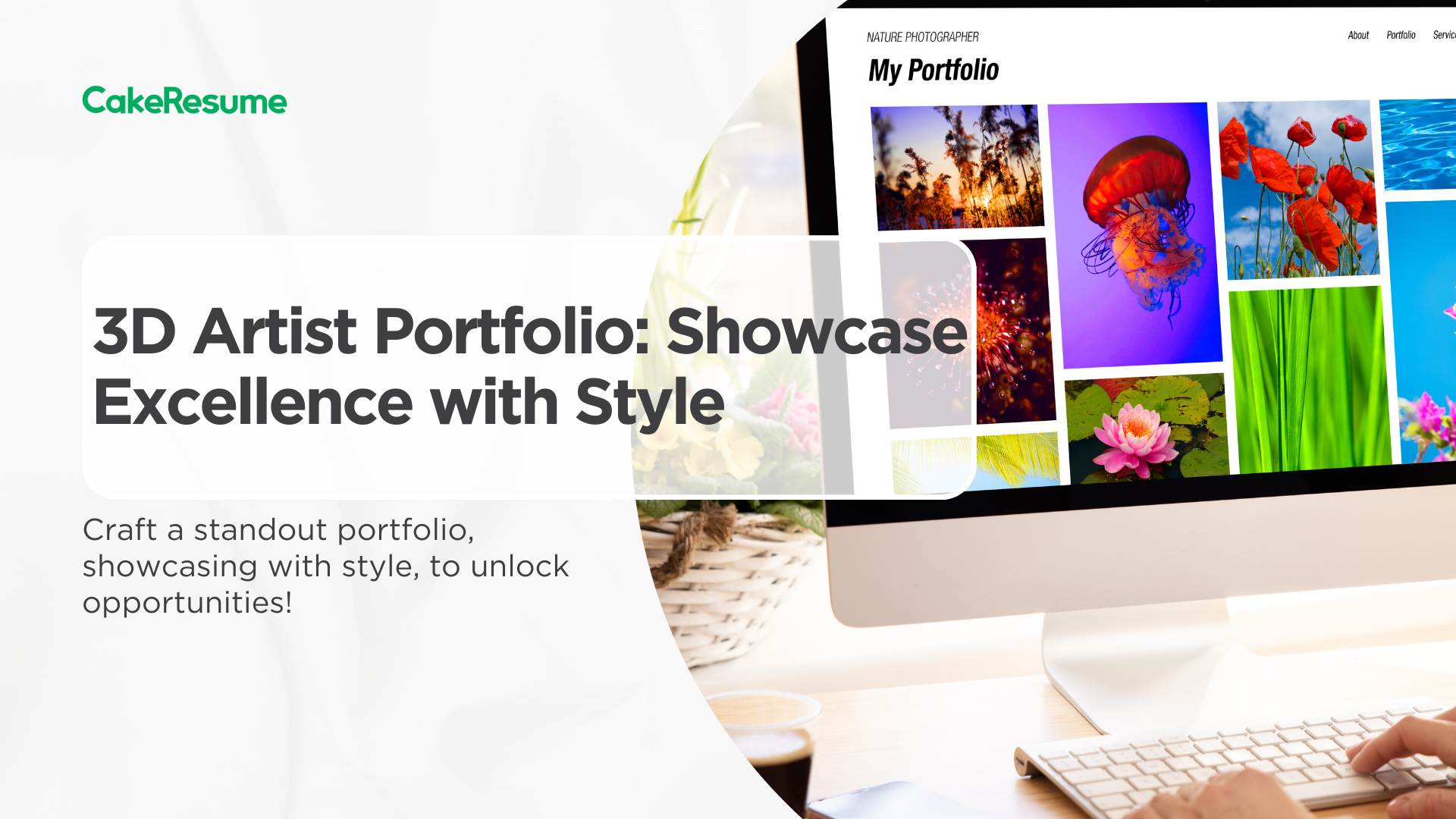
What does a 3D artist do? Also known as CGI (computer-generated imagery) artists, they craft still and moving visual effects using computers. 3D artists create models of products, environments, and animations. The demand for 3D artists is on the rise, particularly in industries such as video games, films, TV, and virtual reality (VR) that are propelled by advancing technologies.
Why is it important for these professional artists to build a 3D artist portfolio? A portfolio summarizes and collects the best works of an artist. It is a professional way to demonstrate technical and soft skills. Additionally, a 3D artist portfolio helps recruiters understand the artist’s characteristics, styles, and inspirations.
Table of Contents:
3D Artist Portfolio Examples
When creating your very own portfolio, it’s a great idea to start by referencing fellow creators’ portfolios to understand what a 3D artist portfolio normally looks like.
Below is a list of various 3D artist portfolio examples:
- Junior 3D Artist Portfolio
- 3D Environment Artist Portfolio
- 3D Generalist Portfolio
- CG Artist Portfolio
- 3D Character Artist Portfolio
- 3D Game Artist Portfolio
- 3D Animator Portfolio Website
- 3D Environment Portfolio
- Freelance 3D Artist Portfolio
- 3D Lighting Artist Portfolio
- 3D Architectural Artist Portfolio
- 3D Modeler Portfolio Website
- Entry-Level 3D Artist Portfolio
- 3D Visualization Artist Portfolio
Junior 3D Artist Portfolio
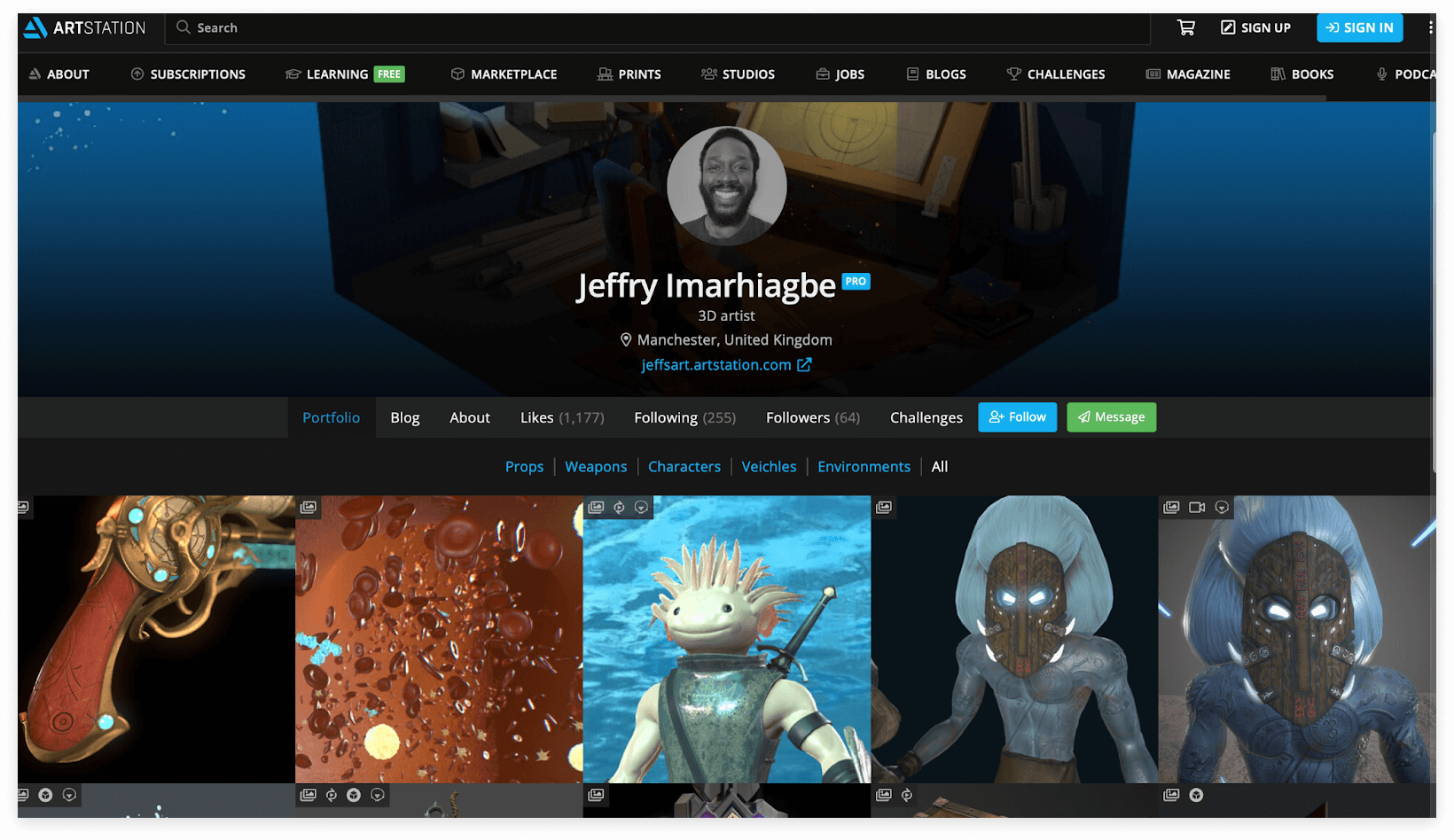
Jeffry is a junior 3D artist who displays his 3D artist portfolio with wit and style. His main focus is characters.
3D Environment Artist Portfolio

Louis Stelfox showcases his work that was completed during his 2nd year at university. He explains the technical details of the artwork very well. In addition, he also won the Rookie Awards in 2019, which is an important milestone to display on his portfolio.
3D Generalist Portfolio
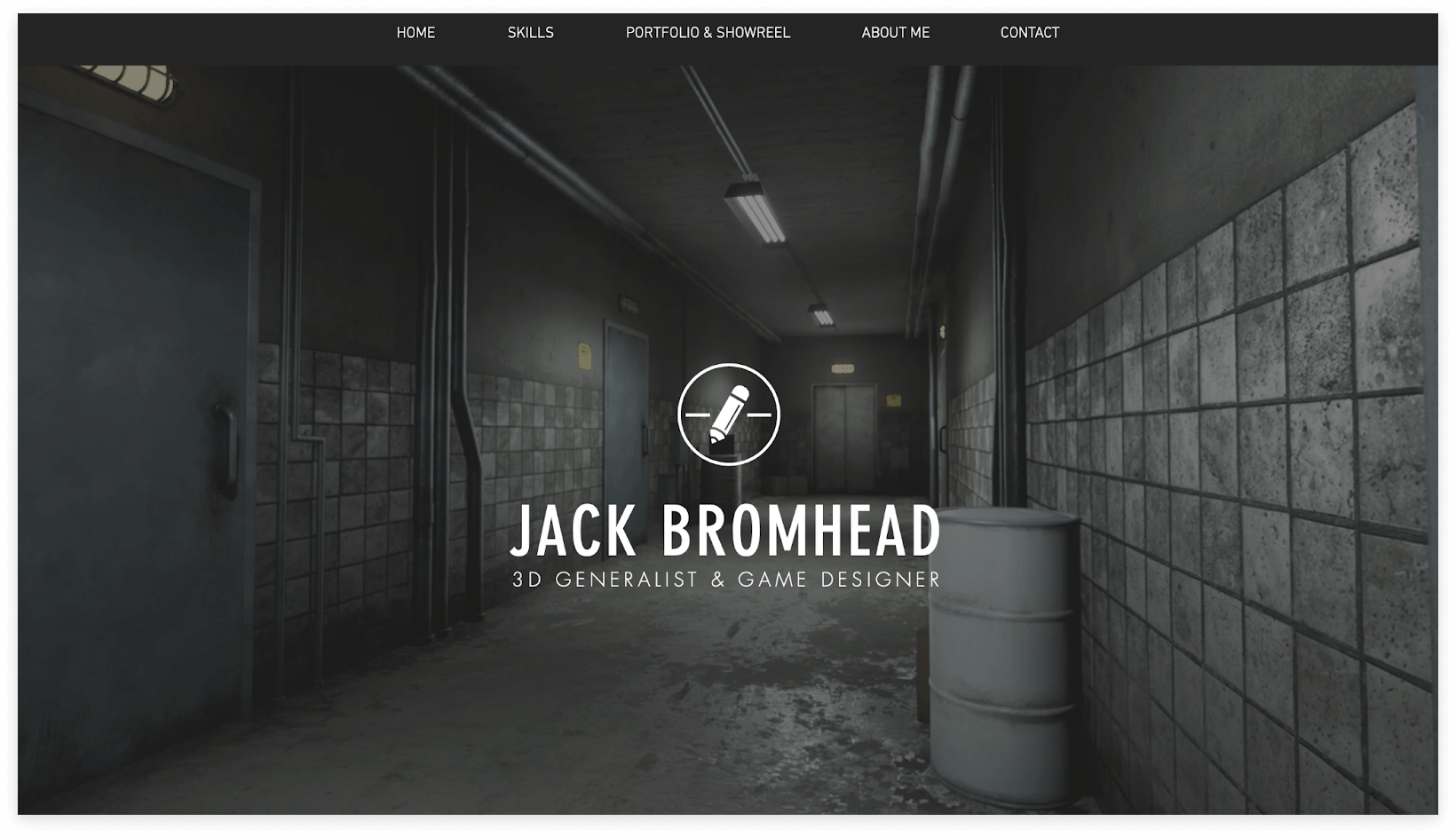
Jack gave a very strong homepage impression. He shows the animation work directly on the homepage. His level of confidence is what we should admire.
CG Artist Portfolio
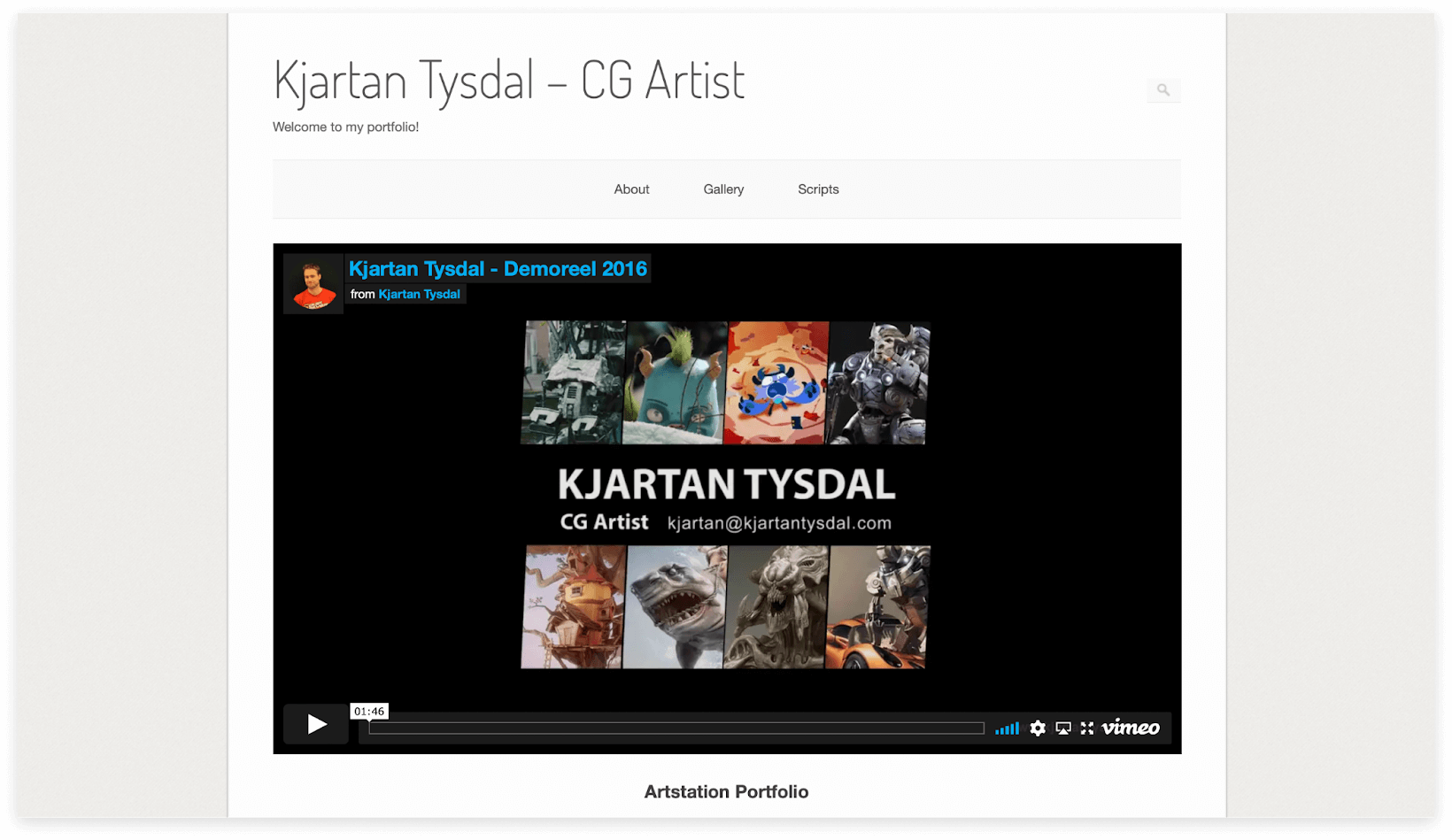
Kjartan shows his talent in CG art by demonstrating a video. He has different categories of CG art, which makes it easier to browse through.
3D Character Artist Portfolio
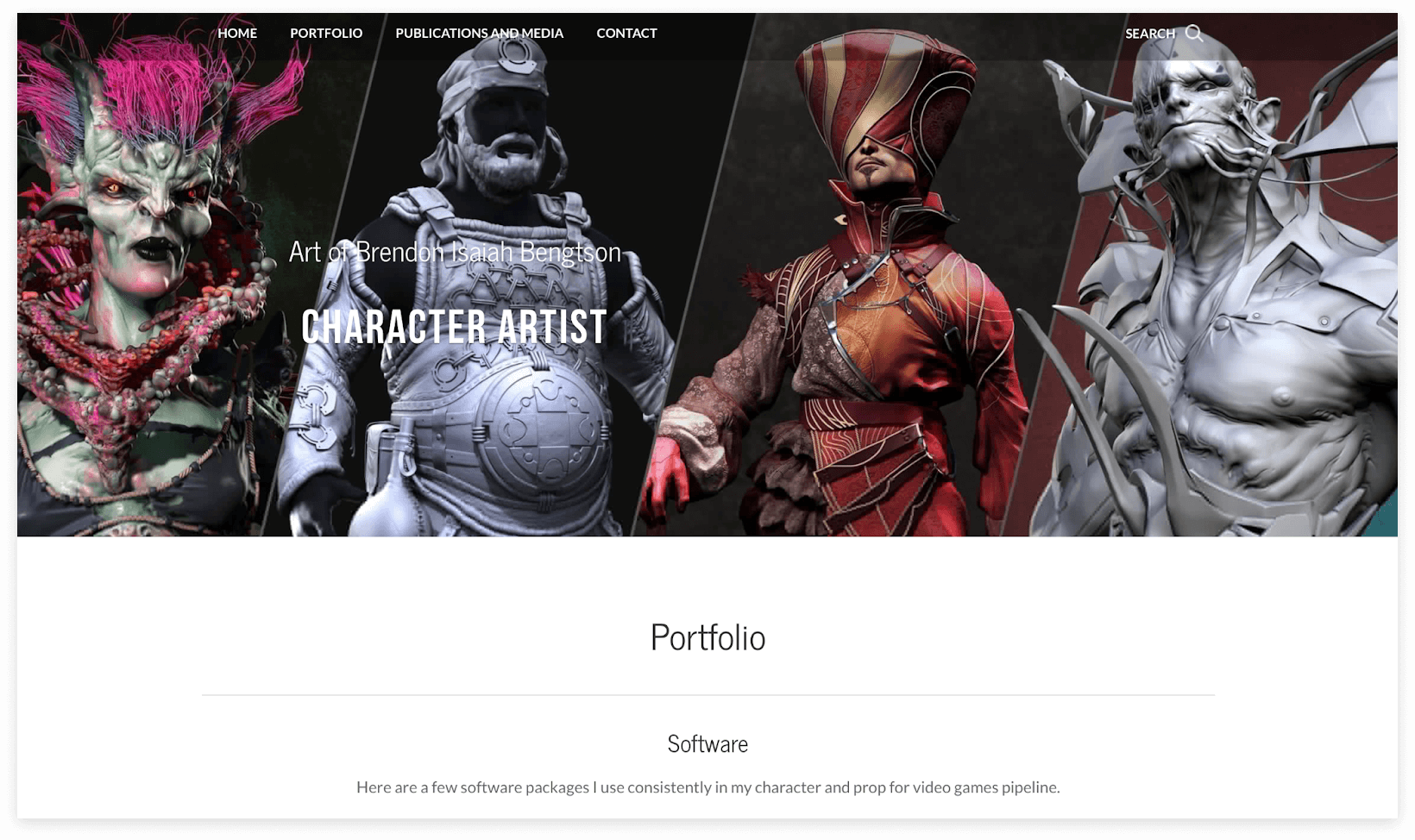
Brendon brings forth a strong impression of his character art. You can directly access his work on the front page. His style mimics that of video game characters. He also selected his best works so the website is concise.
3D Game Artist Portfolio
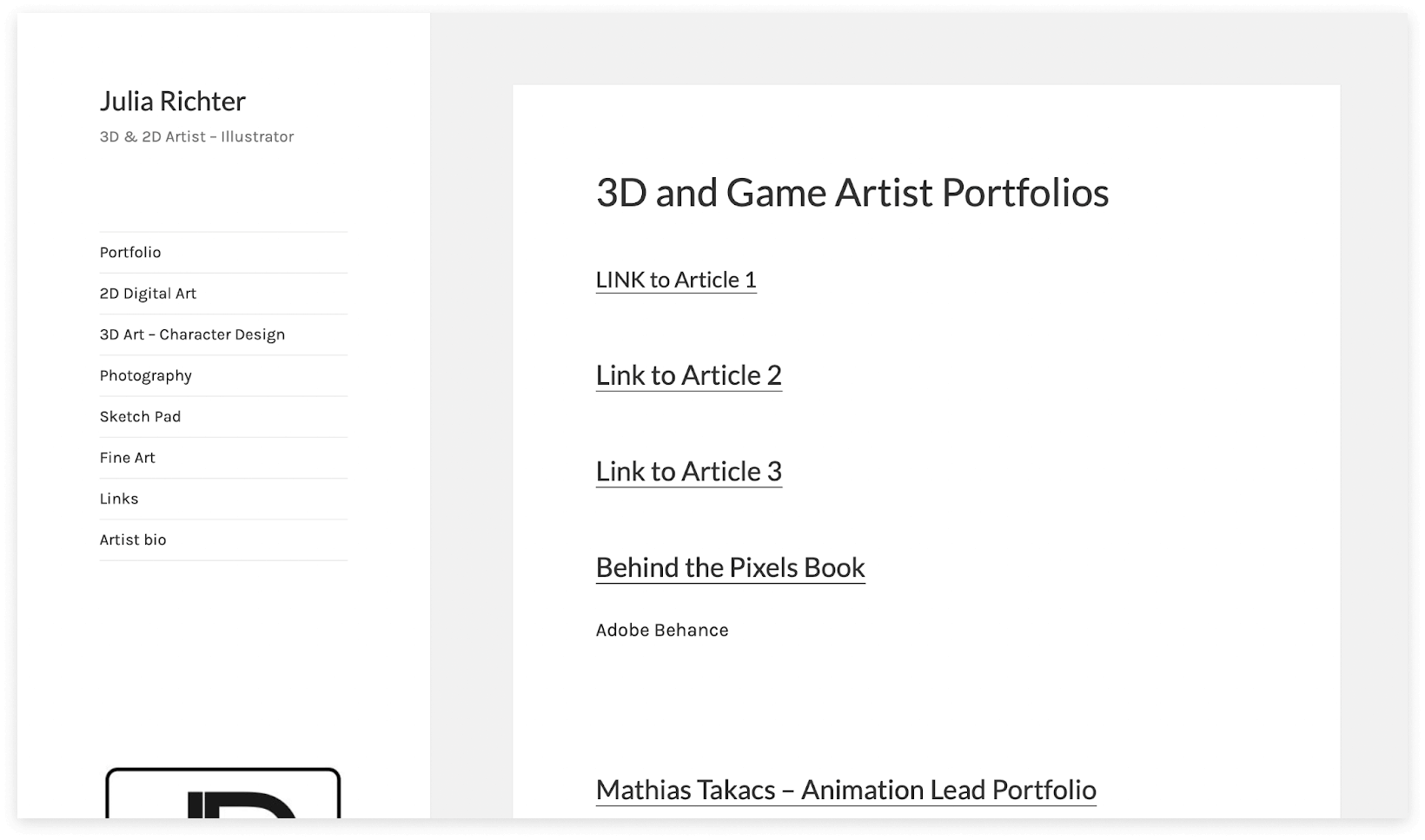
Julia specializes in 3D, 2D, and illustration. Although you cannot see her artwork on the homepage, she has carefully crafted different categories of work for you to browse through, making it easy for potential clients or employers to find the type of work that is relevant to them.
3D Animator Portfolio Website
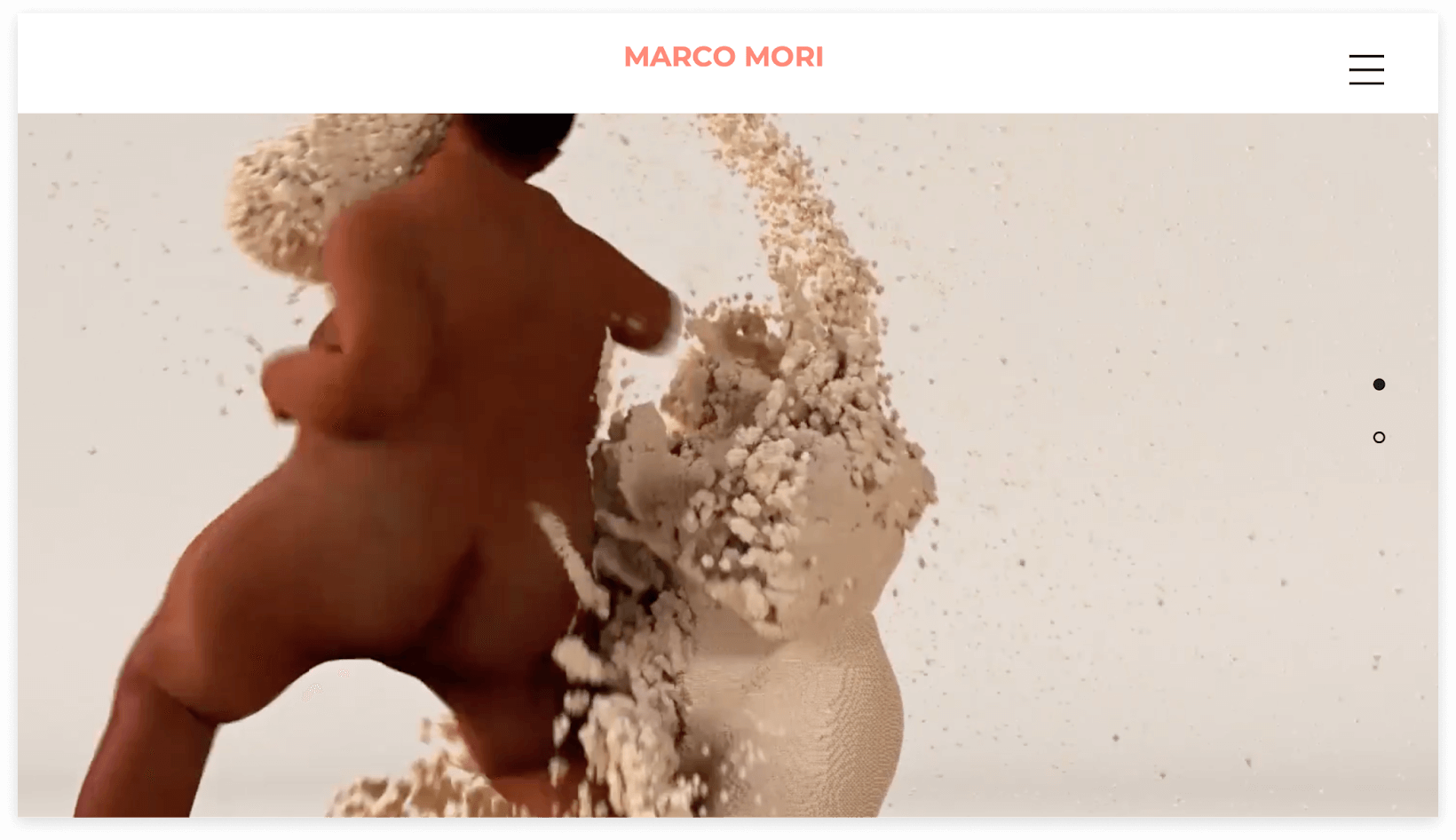
Marco is not only a 3D animator, but he is also extremely artistic. His style conveys a preference for displaying grotesque and outlandish style. Since his portfolio has such a strong style, people are easily impressed by it.
3D Environment Portfolio
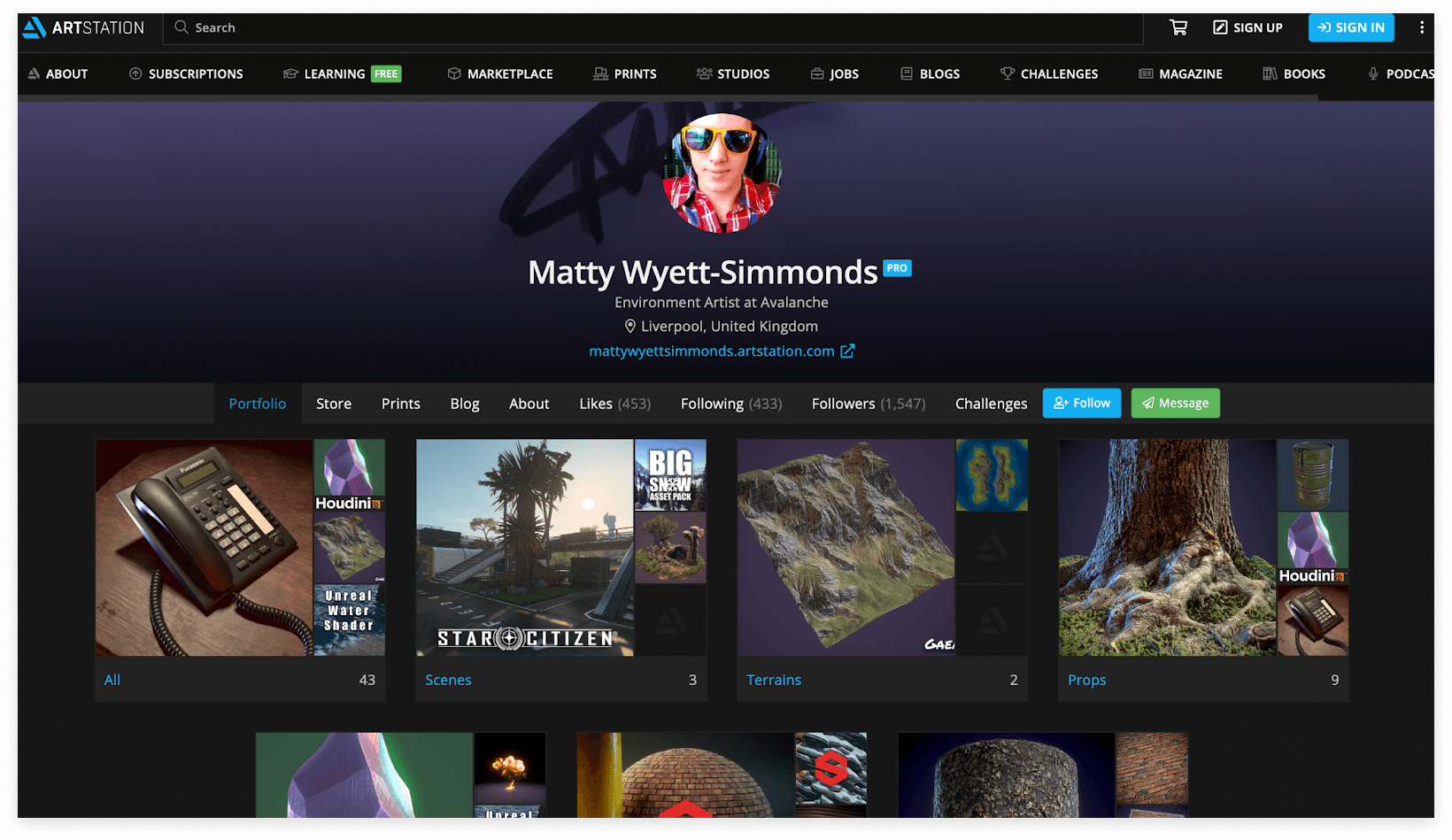
Matty is another example of a 3D environment portfolio. He focuses on the objects of the environment. His work is well organized and neat, so people can navigate his portfolio easily.
Freelance 3D Artist Portfolio
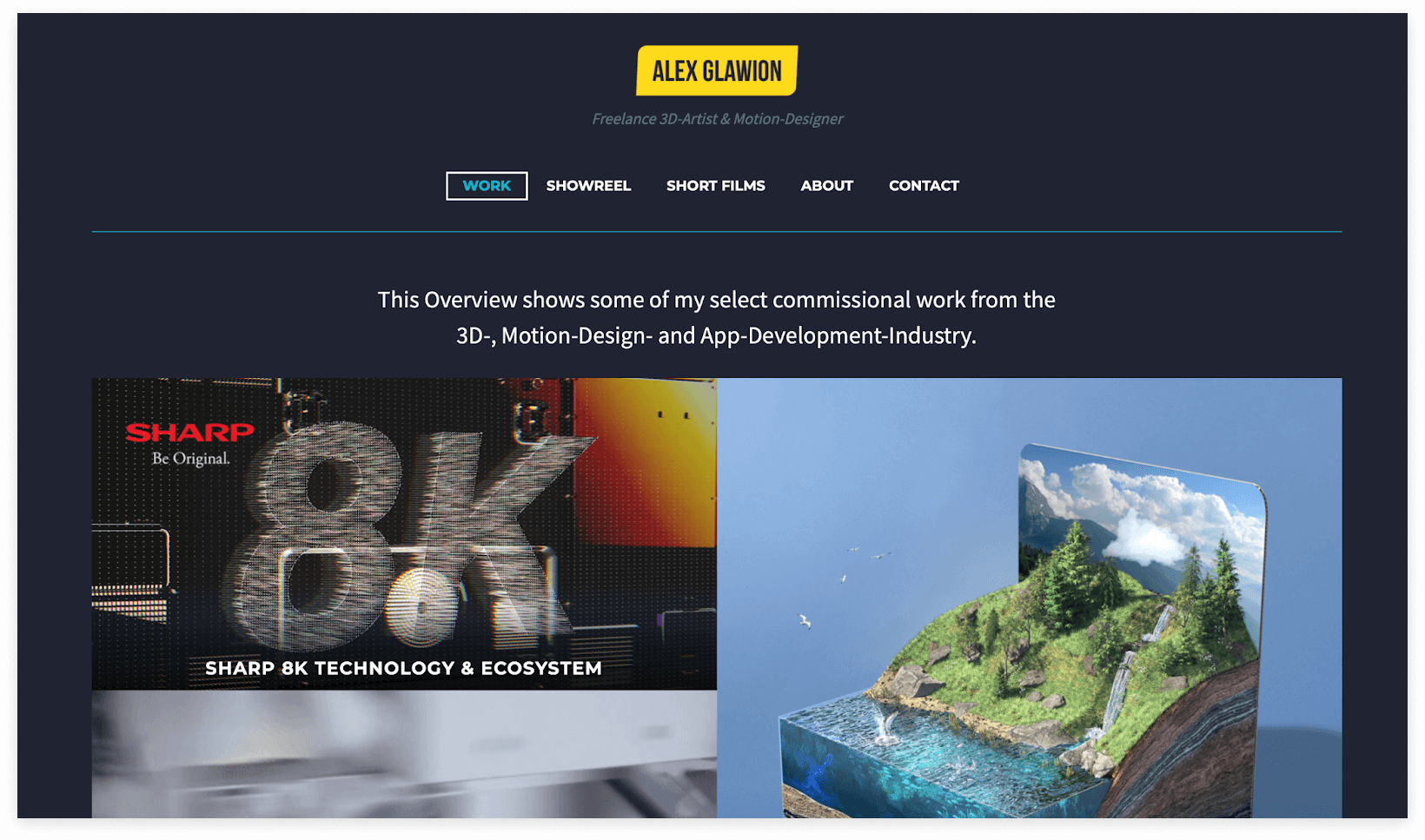
Alex is good at displaying his work. His short description talks about what he does and the kinds of 3D art he specializes in.
3D Lighting Artist Portfolio
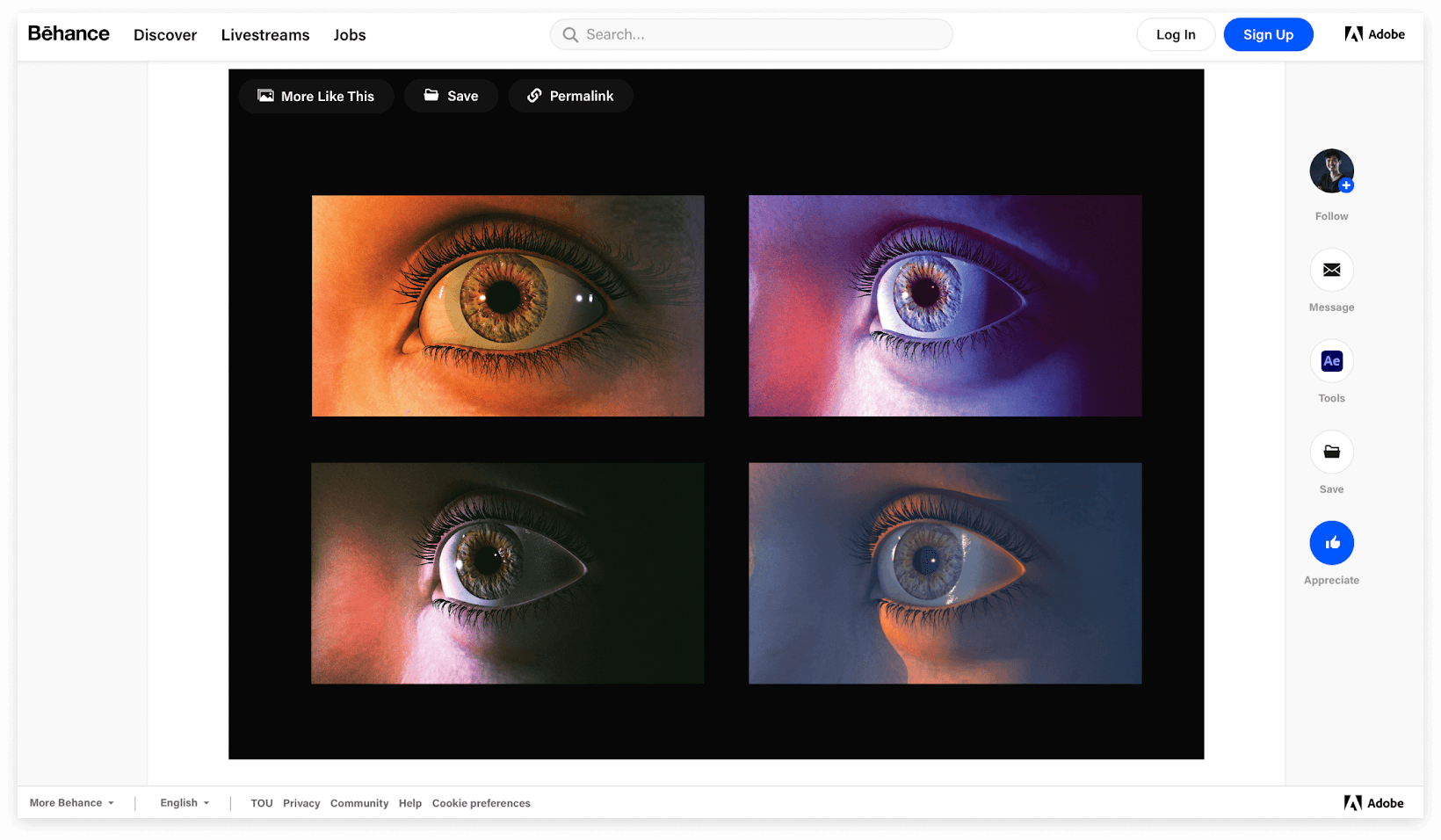
Allan’s portfolio is straightforward. He shows his 3D light work through videos and high-quality images. Displaying high-quality images is important as the audience wants to engage with details in lighting artwork.
3D Architectural Artist Portfolio
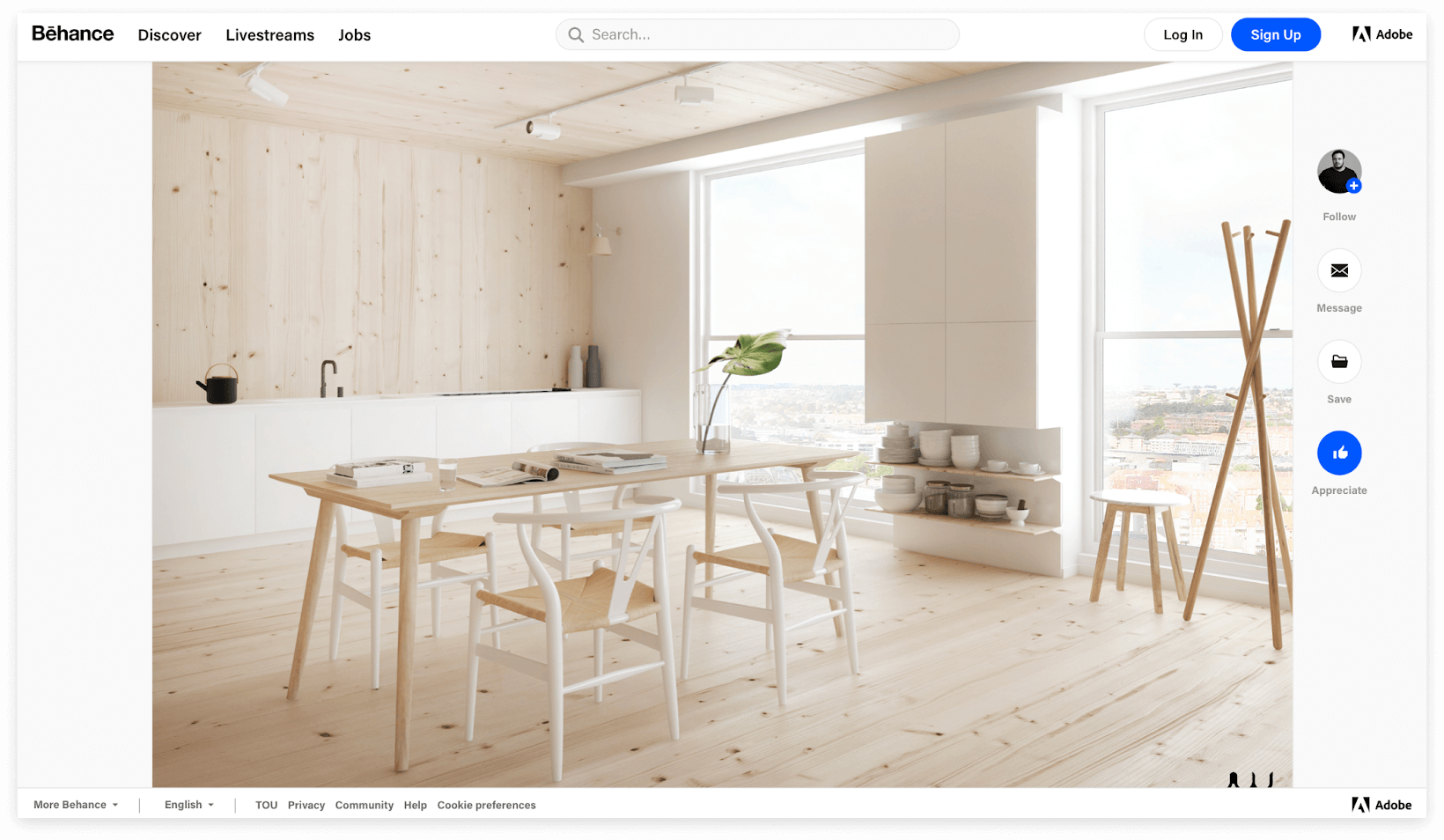
Javier is a 3D artist that focuses on interior and furniture visualization. Javier’s work is unique because he knows his niche, so he doesn’t go beyond the categories of interior and furniture visualization.
3D Modeler Portfolio Website
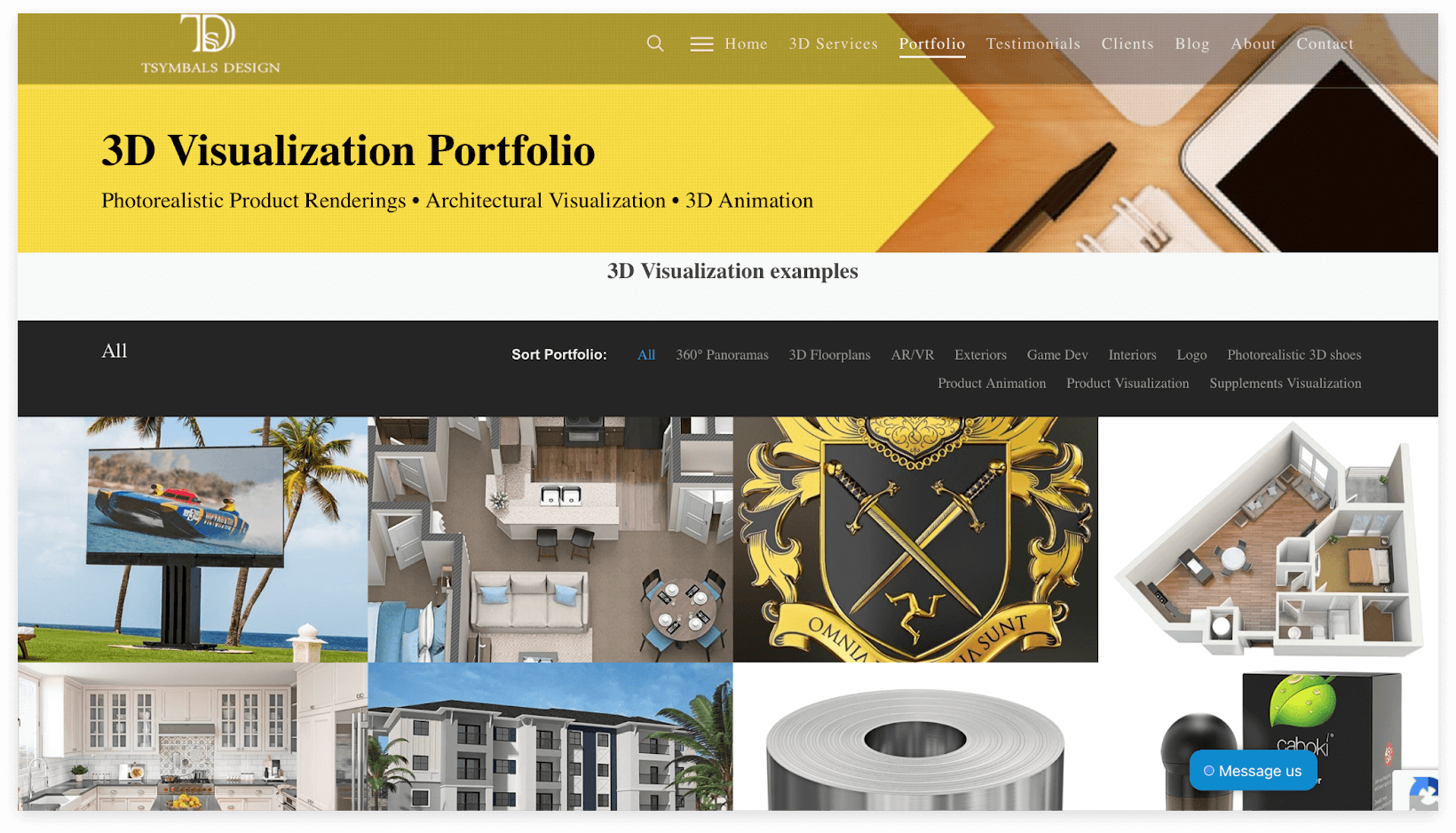
Unlike previous examples, Tsymbals Design is a collective of individuals who do 3D visualization and many others. Tsymbal design shows social proof by showcasing testimonials. Testimonials are important because clients may want to see your previous customers’ reviews.
Entry-Level 3D Artist Portfolio
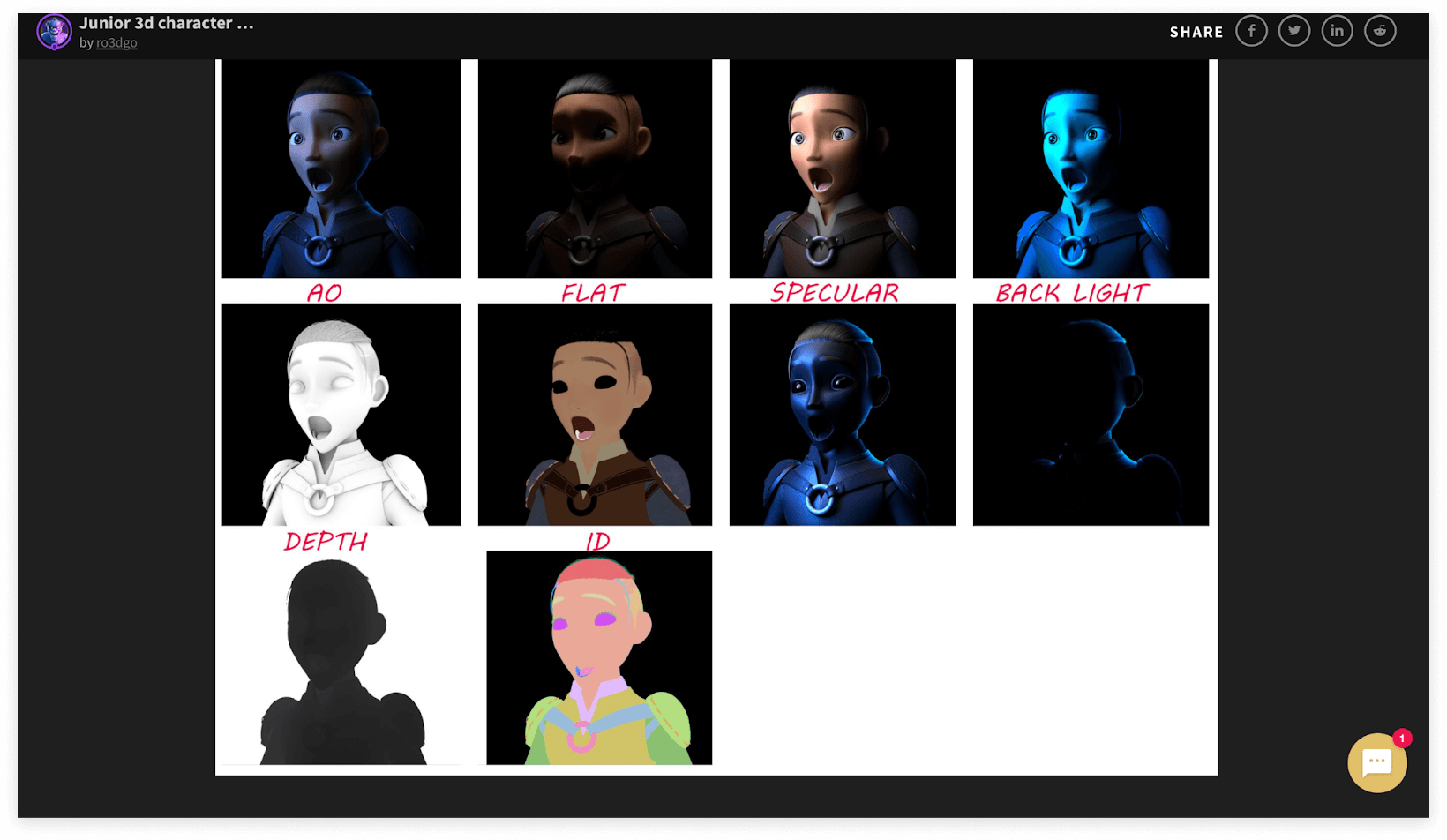
Rodrigo Garcia shows his entry-level 3D Artist portfolio by focusing on the process of his artwork. Many industry experts advise that novel artists can show their skills by demonstrating the processed artwork.
3D Visualization Artist Portfolio
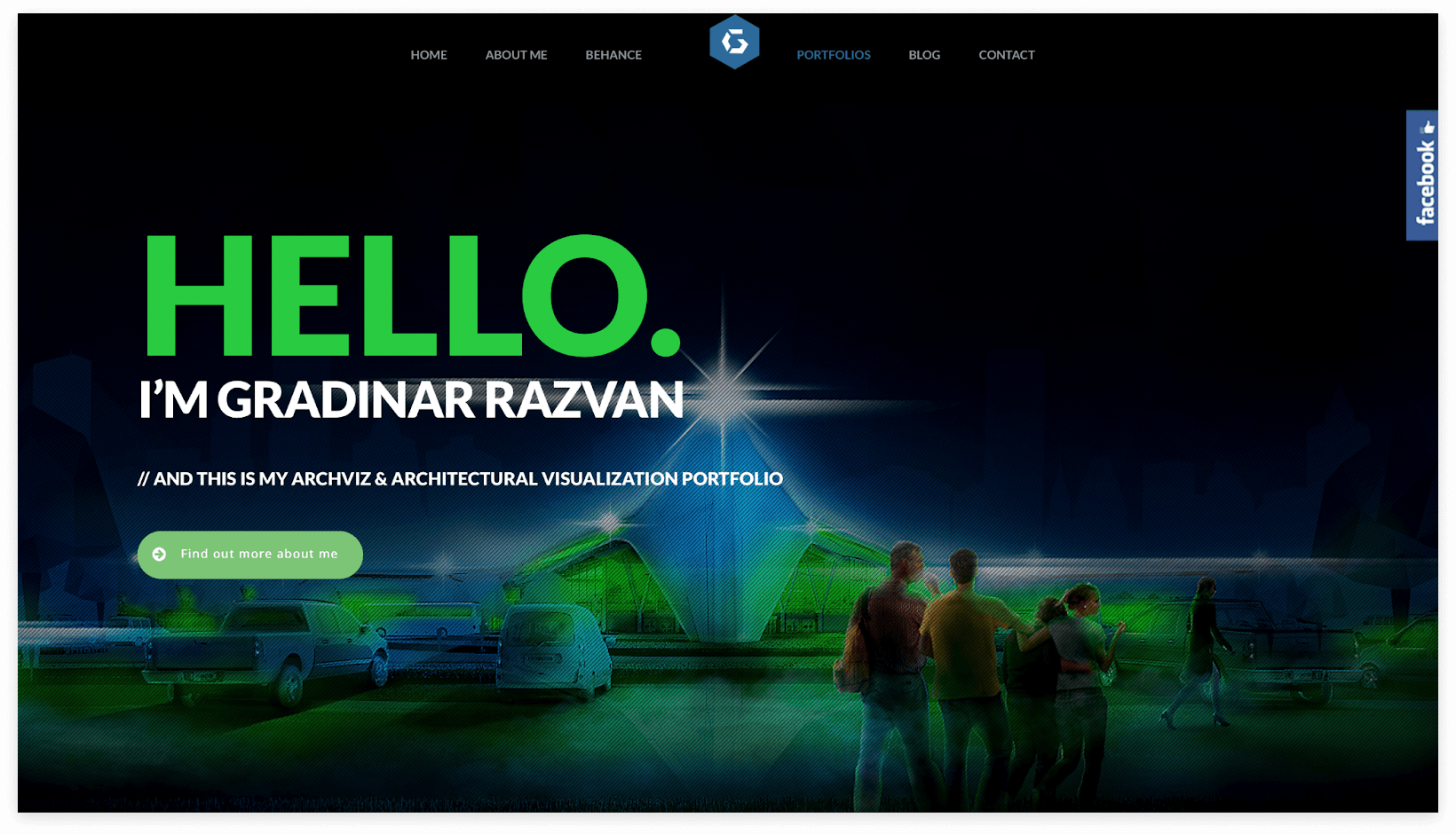
Gradinar’s portfolio focuses more on individual stories and inspirations. For instance, he has segments of texts to explain his service and specialization. It is a good approach in portfolio building when the aim is at getting more clients.
How to Make a 3D Artist Portfolio?
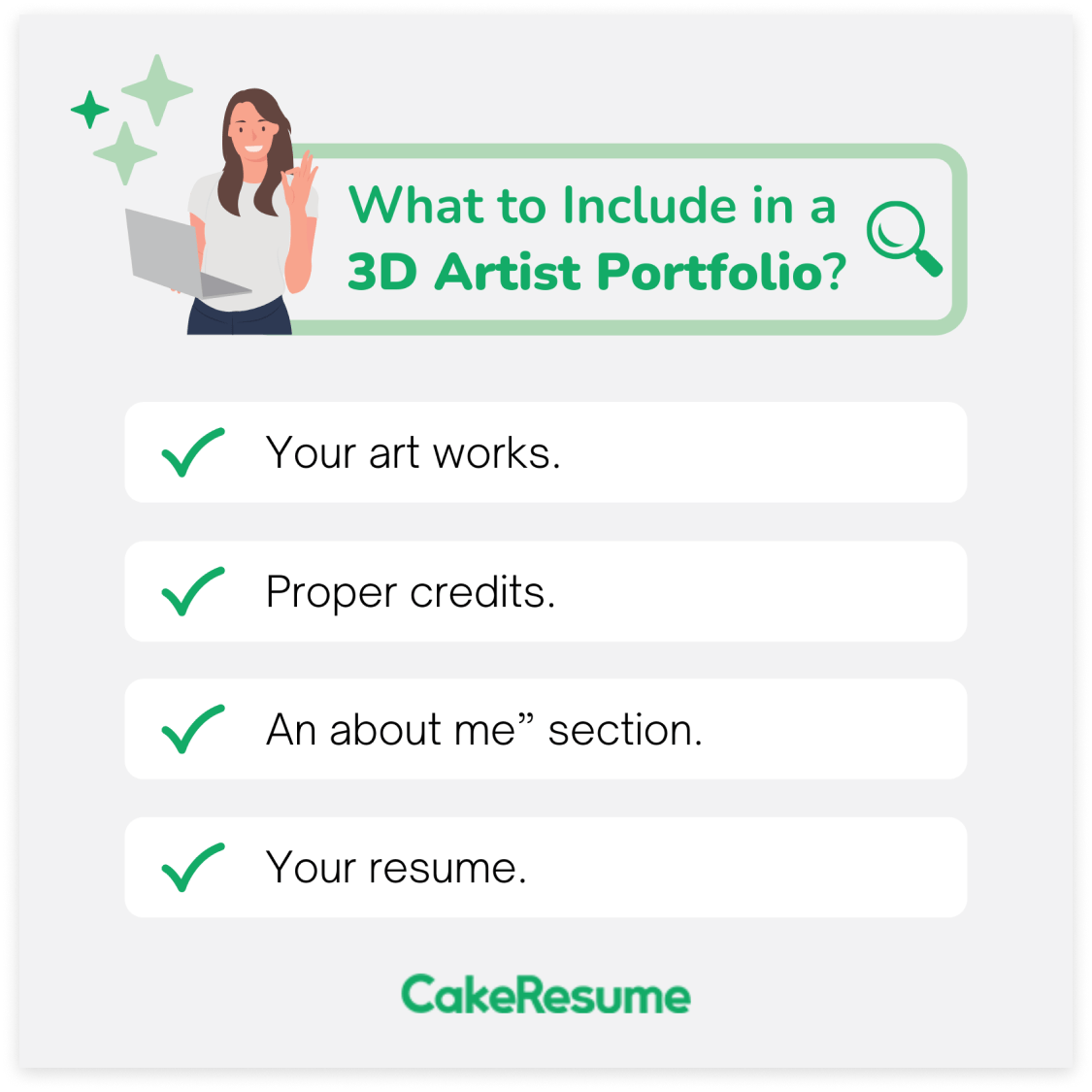
There are four essential elements that need to be included in your 3D artist portfolio:
1. Your art works
Presenting your artwork to employers can be challenging. Employers typically prioritize understanding the technical skills behind your creations. Aim to emphasize specific categories or skills to capture their attention. For instance, if your expertise lies in character building, concentrate solely on showcasing characters. The most effective 3D artist portfolios are not only targeted but also precise in their presentation.
2. Proper credits (if you’re adding group work)
Collaboration is common for 3D artists, often working with other artists. Beyond acknowledging and respecting their contributions, providing a detailed description of your own involvement enhances potential clients' or employers' understanding of your specific skills when evaluating your 3D art portfolio.
3. An “About Me” section
The "About Me" section holds significant importance in a 3D artist portfolio. This section provides a valuable opportunity to delve into your backstory, discussing your origin, educational background, and sources of inspiration. Share insights into your artistic style and personal characteristics; employers appreciate these details as they showcase your uniqueness.
📚Further reading: How to Write About Me Section in Resume (Resume Examples and Tips)
4. Your resume
Incorporate your resume into your 3D artist portfolio, allowing employers to evaluate your qualifications through your work history. Seize the opportunity to showcase your past experiences, particularly if you have collaborated with prestigious clients or renowned companies.
3D Artist Portfolio Websites to Create an Online 3D Artist Portfolio
An essential step in creating your 3D artist portfolio website is to choose a third party platform. Here are a list of platforms you can consider when creating your online 3D artist portfolio:
1. CakeResume
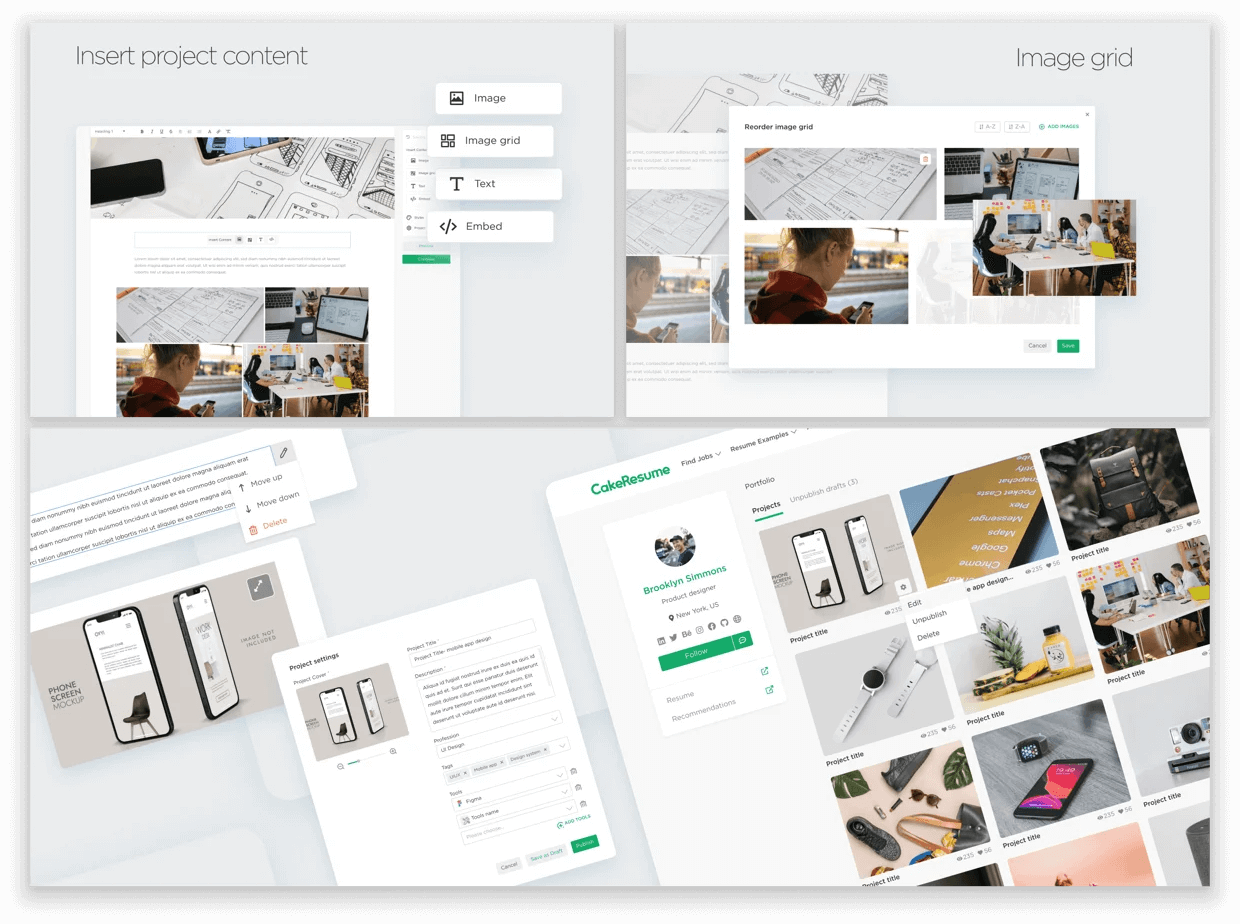
CakeResume is the best free resume builder that provides a free portfolio with flexibility to do multiple edits. Some of the features include:
- Texts
- Single images
- Grid images
- Embed media (great for animation video!)
- Changeable color palette for backgrounds
CakeResume is a good choice if you want to create your 3D artist portfolio websites for multiple portfolios.
CakeResume is a cutting-edge online resume builder and online portfolio maker that allows professionals to build and maintain their online presence. We provide you with hundreds of free resume templates and various great resume examples that help showcase the best you.
2. Artstation
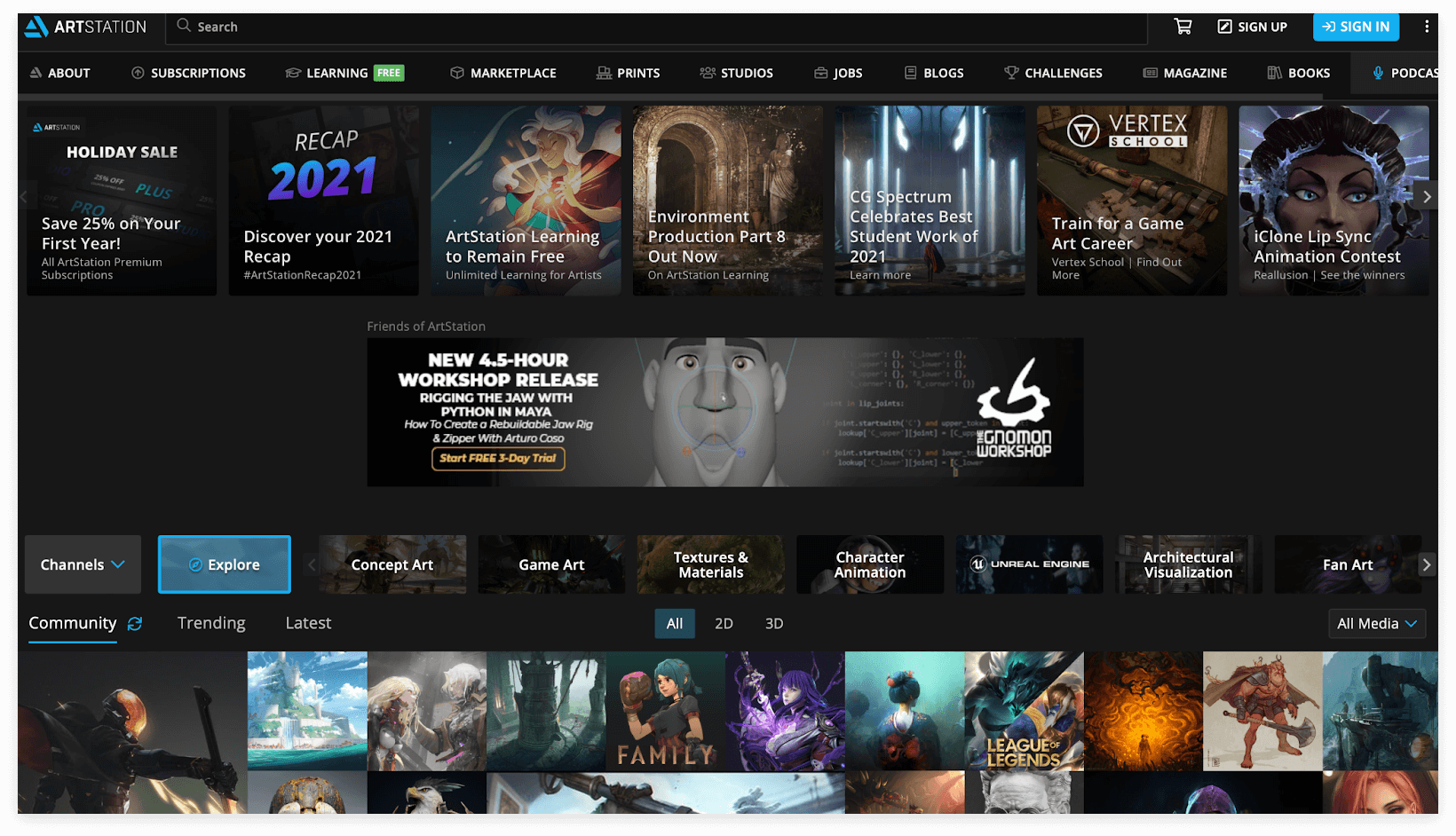
ArtStation is known to be the platform that gathers 3D artists. If you want to showcase your online 3D artist portfolio to the right people in the industry, then ArtStation might be a great choice for you.
Features of ArtStation include:
- High-resolution images, videos, Marmoset and Sketchfab 3D scenes and more.
- The platform gathers every professional in the art industry
- All of your uploads will automatically update the portfolio website
ArtStation is a decent platform if you are a creator who wants to seek out opportunities from people in the art industry.
3. CGSociety
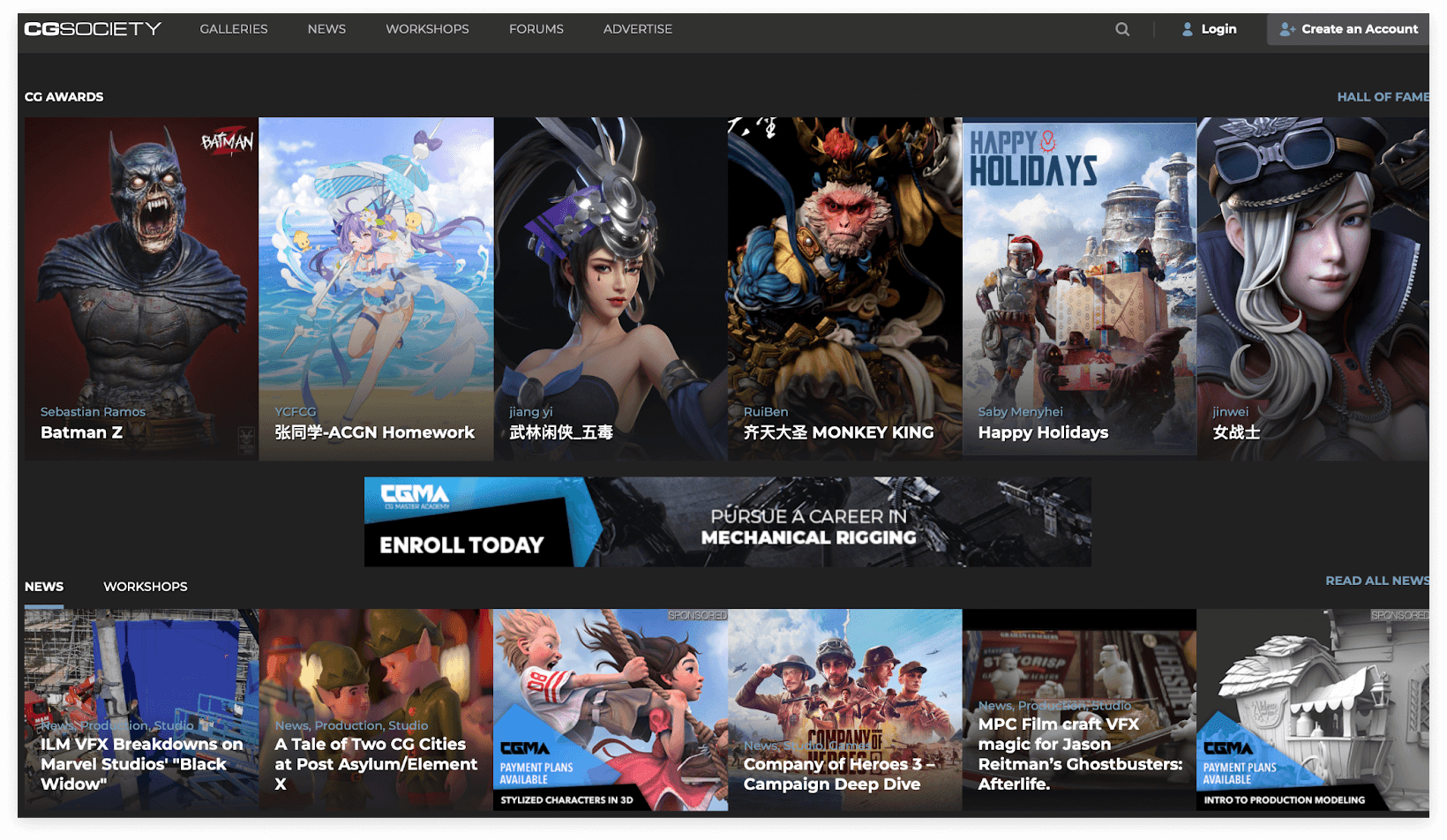
CGSociety is a platform for digital artists and creators. It provides a wide range of services to connect, educate, promote, and celebrate excellent digital art.
Features of CGSociety includes:
- Workshops to learn more about digital art (3D character, environment design, motion graphics, etc).
- Forums to connect digital artists and creators
- Gallery to see the best works (people can reward each other for different skills)
Tips for Creating the Best 3D Artist Portfolio
Tip 1: Categorize your works
If you are a 3D artist with multiple styles and techniques, it is beneficial to categorize your works. Categorization skills can show your presentation skills, and it is easier for the audience to find your work.
Tip 2: Update your portfolio frequently
As a creator, it is important to update your 3D artist portfolio frequently. Try to include 3-5 pieces of your recent work to help the audience understand what you are working on right now.
Tip 3: Less is more
A lot of artists tend to fill their 3D artist portfolio with a bunch of work. But the audience can easily get distracted when you overwhelm them with too many pieces of artwork. Focus on presenting only your best work.
Tip 4: Display your art first
To capture recruiters' attention, feature your artwork prominently on the front page of your online 3D artist portfolio. This is crucial because visitors typically spend only a few seconds on a website, and you aim to grab their attention swiftly. Make those crucial first seconds count by showcasing your best work upfront.
Tip 5: State the position you intend to fill
If you are seeking employment, ensure to specify the position you are targeting on your online 3D artist portfolio. This makes it easier for recruiters to quickly understand your career goals and aspirations.
🔑 Key Takeaways:
- A 3D artist portfolio is a way to showcase your work and brand yourself. It’s important to remember that showcasing work isn’t about the “quantity”. It is about the “quality” of your portfolio.
- If you want to brand your portfolio even better, consider launching the brand on other social media platforms. Instagram is a good option for social media outreach. TikTok is also a good choice if you want to showcase the process of creating 3D art.
--- Originally written by Diana Shih ---
Khám phá thêm tài nguyên tuyển dụng và nghề nghiệp
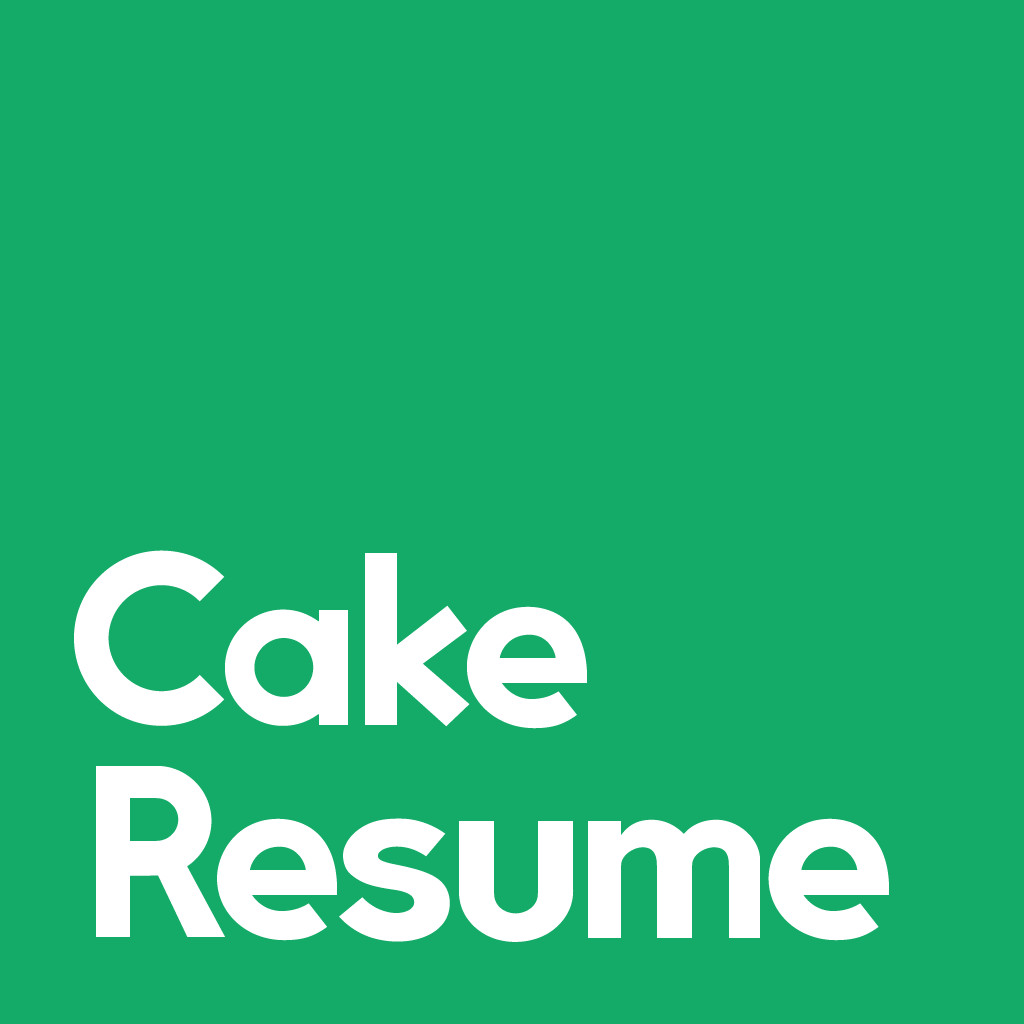
With the intention of helping job seekers to fully display their value, CakeResume creates an accessible free resume/CV/biodata builder, for users to build highly-customized resumes. Having a compelling resume is just like a piece of cake!







